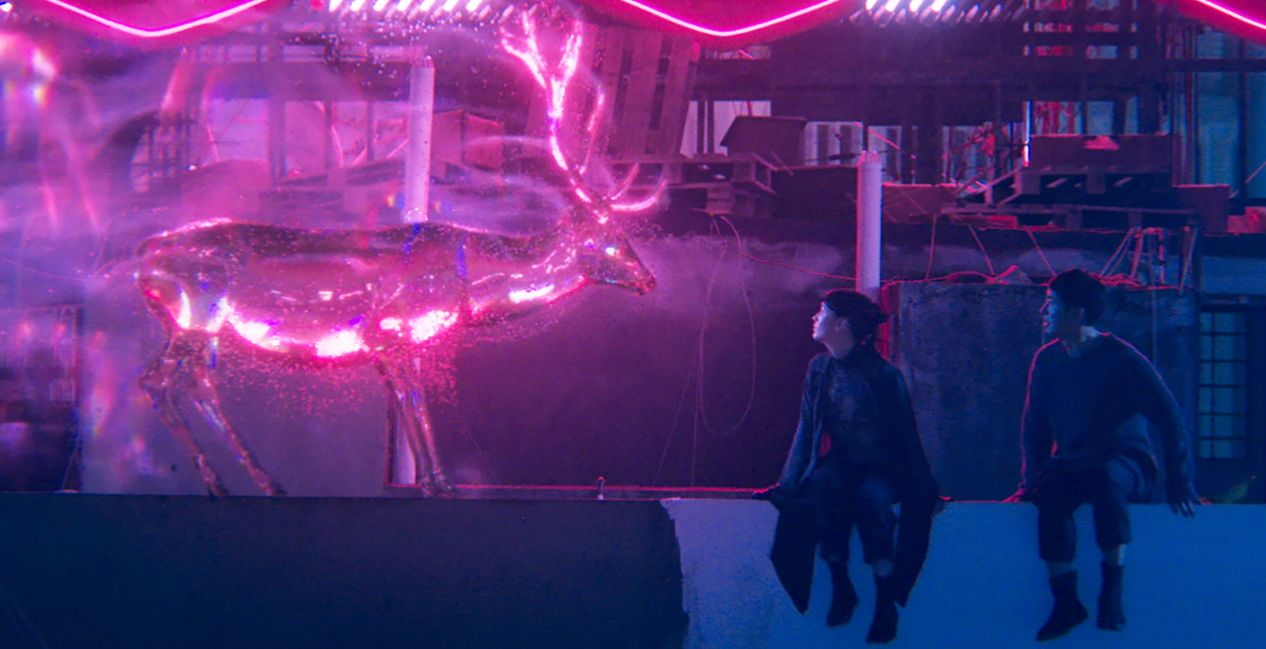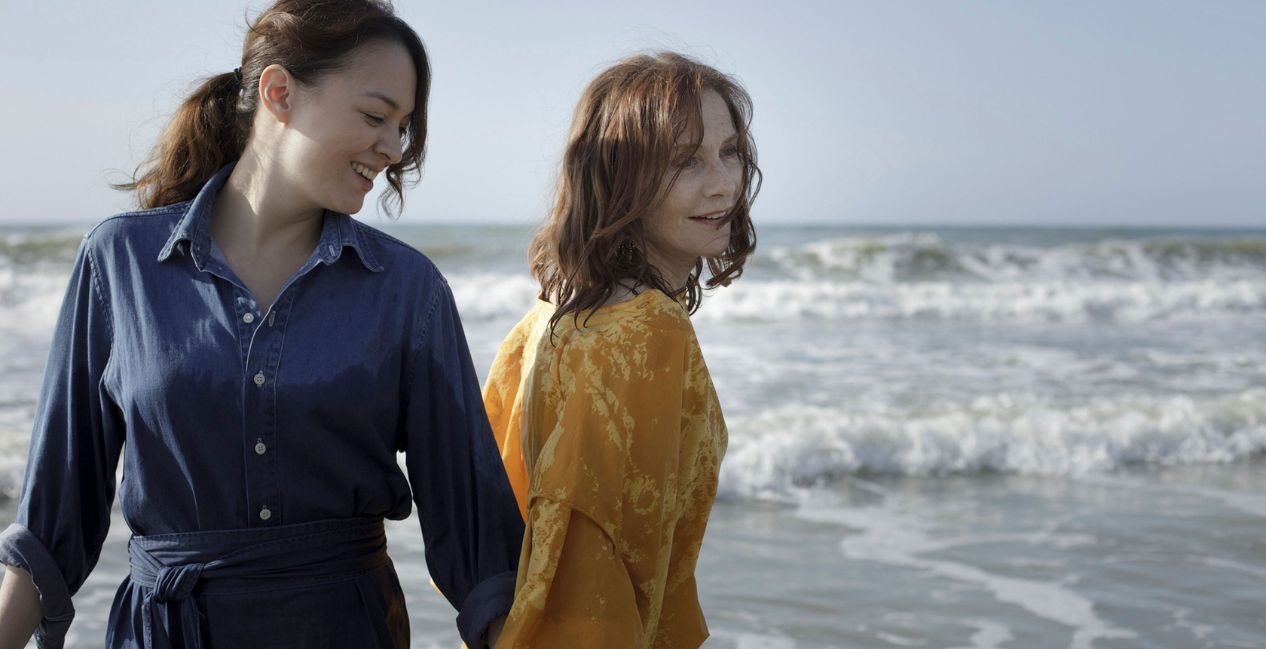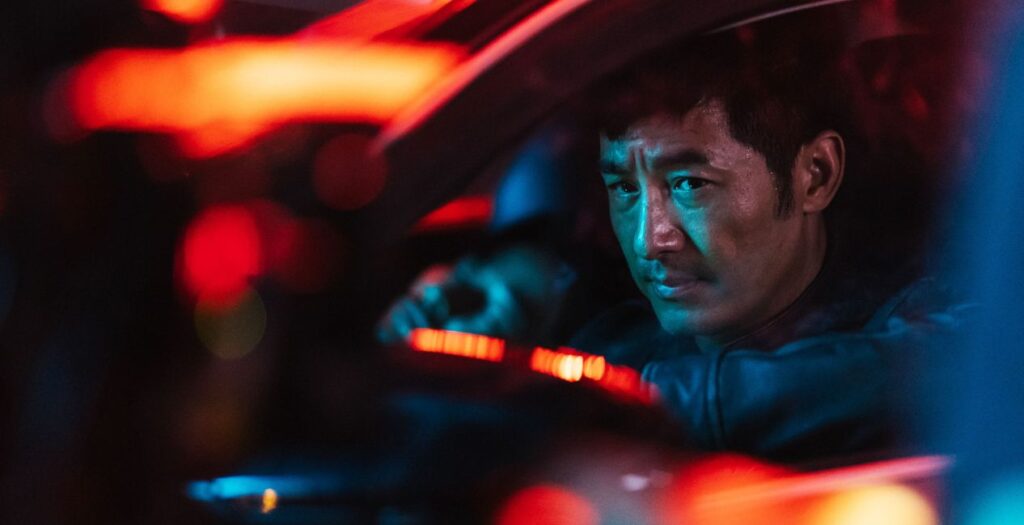The intersection of the virtual world with our own is a rich well to pull from. Few have managed to pull something truly nourishing from it, and LUZ, writer-director Flora Lau’s latest film debuting at the 2025 Sundance Film Festival, can’t build much substantial out of that thematic backbone. LUZ certainly tries, backed by an easy-on-the-eyes aesthetic and honest performances, but its wandering nature and lack of real insight leaves it as a missed opportunity.
At some nondescript point in the future, in Chongqing, China, Wei (Xiaodong Guo) tries to connect with his estranged daughter Fa (Enxi Deng), who has become a cam girl while not even knowing that he’s still alive. In Paris, gallerist Ren (Sandrine Pinna) attempts a reconnection of her own with her stepmother, Sabine (Isabelle Huppert). In their spare time, Wei and Ren wade into the waters of virtual reality to escape their present circumstances. However, that escape reveals itself as a method for them to connect to the people they love in a roundabout way.
LUZ catches the eye, no doubt about that. Chongqing is depicted as a neon-lit metropolis by cinematographer Benjamín Echazarreta. Its enormity is a marvel as much as it is agoraphobia-inducing, leaving Wei seeming the size of a bug hanging on to a sprawling urban organism. Paris is depicted with less specificity, more or less looking how one would expect Paris to look, although there’s an air of loneliness that reinforces a melancholy mood. Altogether, it’s not a bad visual choice.
LUZ is visually stunning, with each setting standing apart with its own aesthetic language.

The world of virtual reality introduces deep pink, blues, purples, and the occasional red, with overlays that more or less make sense of the world already around by game-ifying it. Serious kudos must be given to an on-point depiction of how VR can work in certain circumstances, more specifically, VR/Augmented Reality integration. Scenes in the VR world boost the colors of the pre-existing world, putting overlays to designate objectives in the game, along with elements like a computer-generated deer appearing.
The actors perform just fine. Xiaodong Guo is perhaps too understated in his performance to be a protagonist, yet brings the right amount of heartbreak and desperation in finding his daughter. Sandrine Pinna has a lot more to work with. Her approach to Ren reads as someone who is poised at all times, often having a blank face, as if to avoid having to face her feelings.
There’s an air of resentment over a perceived abandonment by Isabelle Huppert’s character. Huppert is, as always, quite good, playing someone who’s simply trying to move on from the past but clearly has unresolved regret. These are lived-in, realistic human beings. That doesn’t entirely serve the film, though, as a lot of the character work is dependent on performances that are, in turn, dependent on meaningful arcs to be understood fully.
Flora Lau‘s script does LUZ‘s performances no favors in that regard. Moving at a glacial pace, the film often involves characters sitting in rooms having conversations that go on at least a minute past their natural ending point. The dual protagonist bit is a gambit that doesn’t work, as splitting the focus would requite a precise hand that Lau just doesn’t seem to have on this project.
A lack of clarity in the screenplay makes it difficult to gauge intent.

It’s often unclear what’s supposed to be of significance in each given scene. Oftentimes, LUZ looks like a work of art, a work of art that the audience is not able to get on the level of. There’s a troubling lack of clarity of what’s happening story-wise. The integration of the VR element feels like an afterthought, a fascination Lau will return to whenever they see fit, mucking up the core of LUZ in the process.
Momentum is virtually non-existent. Moreover, for such a large component of the movie, it’s unclear what Lau is actually trying to say about VR. Digital communication is sometimes seen as an escape, other times as a way of re-establishing connection. Or maybe it’s a way to remember those who have left? LUZ is far too scattered to come to any cohesive point. By the time the ending credits roll, there’s a pang of disappointment, as none of its parts have amounted to much.
LUZ is the kind of film that one wants to love. It’s got a bang-up visual aesthetic, the concept is neat, and by all indications this was an uncompromised work. That’s the thing about Sundance films, though – for every transcendent experience, there’s bound to be a film whose experimentation does not work. LUZ musters little more than a shrug.
The failure to really make something of its concept and obviously talented cast leaves LUZ as disconnected from its audience as those in the virtual world might be from reality.
LUZ (2025) world premiered as part of the 2025 Sundance Film Festival.
LUZ (2025)
-
Rating - 4/104/10
TL;DR
The failure to really make something of its concept and obviously talented cast leaves LUZ as disconnected from its audience as those in the virtual world might be from reality.







